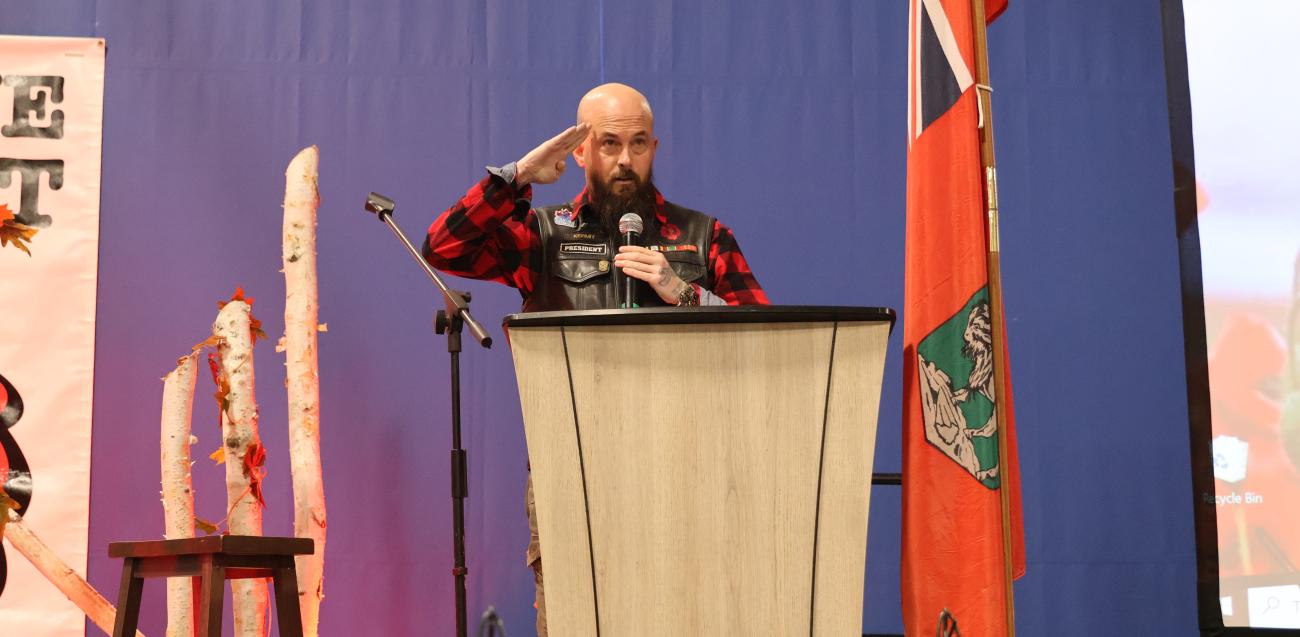Niverville’s annual Remembrance Day service took on a slightly different feel this year due to its new location: the fieldhouse of the CRRC. But the hundreds who gathered there enjoyed the same inspiring experience as years past.
Remembrance Day committee member Natalie Batkis chaired the event.
“Remembrance Day matters to all of us,” Batkis said. “It’s about gratitude, reflection, and community. It’s about pausing for a moment in our busy lives to think about the freedoms we enjoy and the costs of those freedoms.”
This year’s themes focused on service and courage, virtues which transcend the military to also include first responders, teachers, healthcare workers, volunteers, and all those who have dedicated their lives to the service of others.
“That’s what today is all about,” she added. “Honouring those who have served and inspired us all to serve in our own way. The courage of those who went before us reminds us to be brave in the face of challenges, to stand up for what’s right and to take care of one another.”
This year’s guest speaker was Scott Stroh, a retired Canadian military veteran and master sailor. He spent 17 years of his life with the Royal Canadian Navy. His time began in Halifax working in the Maritime Coastal Defence Reserves. Eventually he was transferred to the Halifax guided missile frigate.
Stroh regaled the audience with some of the more lighthearted moments from his early career, including finding himself on the wrong ship and having to endure the humiliation of this unfortunate mistake for weeks to come.
It didn’t take long, though, for the storytelling to get real.
“I was on a ship overseas off the UK coast when 9/11 happened,” Stroh said. “We actually didn’t get a full visual of what happened until days later, the technology being not as advanced as it is today. But within hours of that attack, our posture changed from training to a real-world attack scenario. Weeks later, we were on our way to the Arabian Sea/Persian Gulf as an initial unit in this new war on terror.”
It was a watershed moment for the Canadian military who had, until then, been primarily invested in international peacekeeping efforts.
“You trained for war, but it never dawned upon [you] that we’d be thrown into conflict on a global scale.”
By 2006, Stroh was accepted to the intelligence branch of the navy and by 2010 he found himself in Afghanistan, working as an imagery analyst with the drone program.
The base to which he was assigned in Afghanistan was located at a decommissioned international airport. The military tried their best to bring a little piece of home to these foreign shores by opening restaurants like TGI Friday’s, Burger King, Pizza Hut, and Tim Horton’s for North American soldiers.
“There was a full NHL-sized hockey rink which many retired NHL players came to,” Stroh said. “They got to bring the Stanley Cup and we’d fight them for it.”
In 2013, Stroh was released from the military with what was called an occupational stress injury. In layman’s terms, it’s known as post-traumatic stress disorder (PTSD).
Thankfully, Stroh met a fellow retired military man living in Winnipeg who had dedicated himself to helping stress-injured individuals returning from Afghanistan.
“Under his protection, it was safe to talk about [my injury]. I don’t know where I’d be if not for him. I can only imagine what it’s like for my brothers and sisters who didn’t have that same support.”
Today, Stroh is a strong advocate for PTSD awareness and supports. But he says there is a way to more accurately frame the term.
“This isn’t a disease. I was injured. In October of 2010, I started to feel something was drastically wrong. I couldn’t focus. I fell apart mostly every day, what I’d call just being a hot mess.”
In fact, there is an entire movement across Canada known as the Rolling Barrage, a group who has made it their mandate to change the terminology used to describe this condition as post-traumatic stress injury (PTSI).


